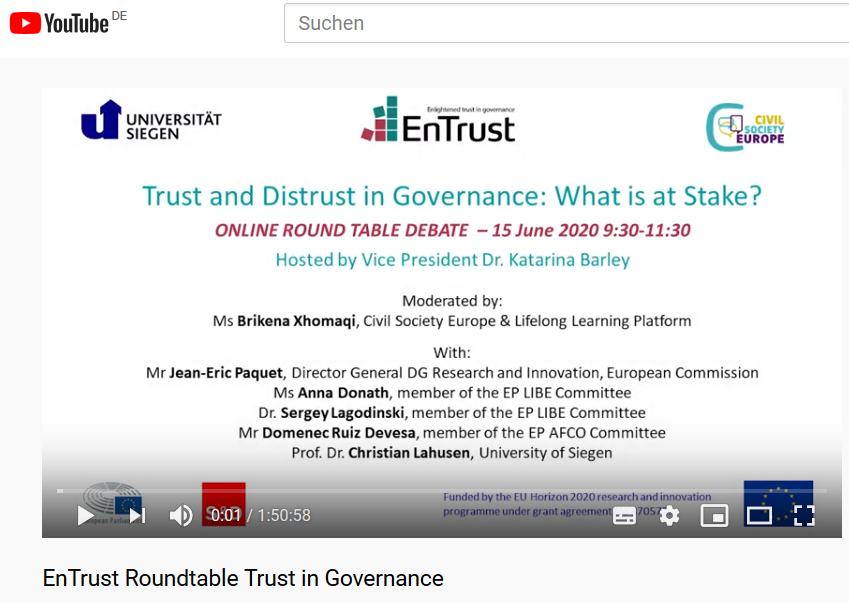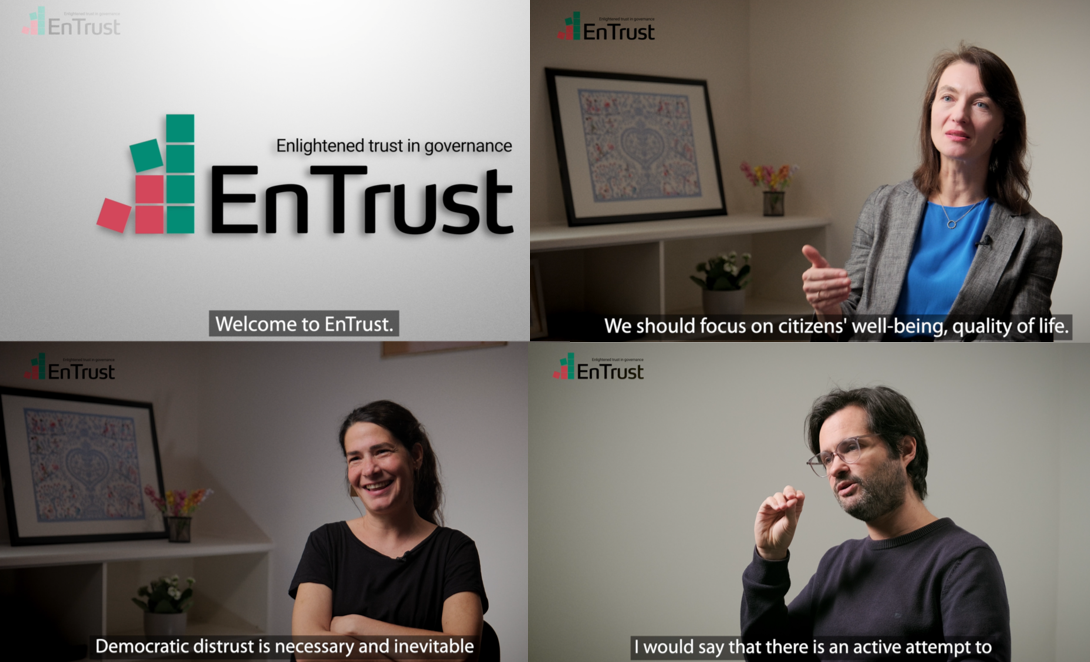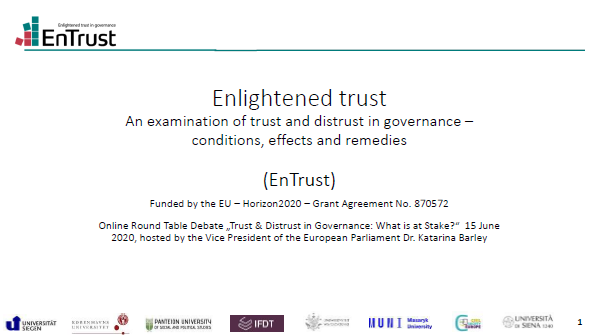On 10th January 2024, the EnTrust project’s Research and Final conferences brought together around 100 people in the European Parliament, including academics, researchers, members of the European Parliament and Commission, civil society, and students. The focus of the conferences was on the issue of trust and distrust in governance.
As the EnTrust project is approaching completion, the Research and Final Conferences aimed to present the main findings of four years of research on the forms, determinants and consequences of trust and distrust in governance, and to further the discussion on how trust in governance can be (re)built, with a strong focus on the EU level. Moreover, the occasion also served as an opportunity to reflect about the vision of young people on the future of the EU, as it hosted the Award ceremony of the EnTrust Youth Contest.
Did you miss the events or do you want to revisit them? Find the highlights here below.
Research Conference
Organised in partnership with the European Parliament’s Partnership Team, the Research Conference gathered the researchers from the EnTrust consortium and practitioners to discuss the results of the project and their relevance for policy making, in three parallel workshops and a final discussion.

The first workshop, “The individual components of institutional trust”, was moderated by Lenka Štěpánková (Masaryk University), and presented some of the findings on social service clients’ trust in institutions (coordinated by the University of Warsaw), and the development of trust at different stages from childhood to adulthood (led by Masaryk University).
The second workshop, “Political and institutional trust and the role of the media”, moderated by Renate Schröder (European Federation of Journalists) and gathering the research teams of Panteion University Athens and the University of Copenhagen, presented the results of a multi-stage media analysis on the dynamics of trust contestation during the Covid-19 pandemic, combined with the results from the EnTrust survey to re-evaluate the assumption of an erosion of trust in news and journalism.
The third workshop, “Social movements, deliberative democracy and civil society organisations: interrelations and methods of policy-making influence”, moderated by Patrizia Heidegger (European Environmental Bureau), presented the results of a research on social movements and their trust towards the institutions (Institute of Philosophy and Social Theory, University of Belgrade), of an experiment with deliberative democracy practices and their impact on the participants’ trust towards the institutions (University of Siena), and of a research on the patterns of trust and distrust between European civil society organisations and the EU institutions (Civil Society Europe).
The final discussions allowed the participants to discuss the main findings of their workshops in a common setting and reflect on overriding implications for policymaking and civil society engagement.
Final Conference
Hosted by MEP Prof. René Repasi, the Final Conference was dedicated to the question of how trust in governance can be (re)built, with a strong focus on the EU level. The conference featured keynote speeches and a high-level panel discussion, as well as a presentation of policy recommendations that encompass different governance levels and stakeholders. The late afternoon was dedicated to the awards ceremony of the EnTrust creative youth contest.
Watch the recording of the event here and find the highlights below.

- Presentation of the main policy-related findings of the EnTrust project
Christian Lahusen, professor of Sociology at the Department of Social Sciences at Siegen University and coordinator of EnTrust, presented the project’s main findings of four years of research on trust and distrust in governance.
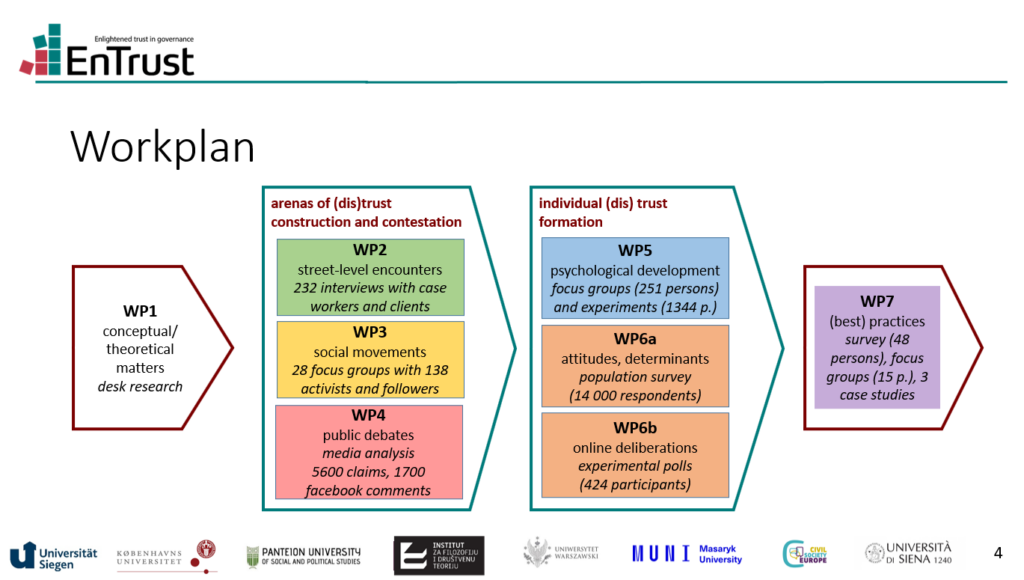
See the presentation with the main findings here.
- High-level panel discussion
Moderated by Carlotta Besozzi, Civil Society Europe’s Director, the panel gathered members of the European Parliament and the European Commission, Civil Society representatives and academics to discuss the value of critical trust and how it can reinvigorate democracy, also in view of the next European elections. Find some highlight quotes below.
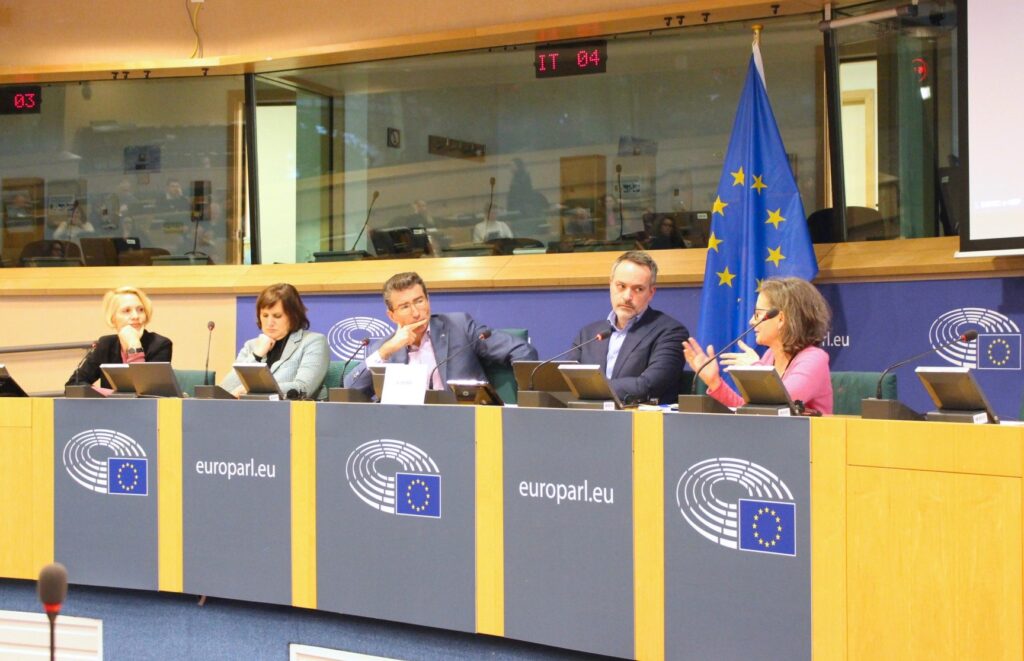
- Marc Lemaître, Director-General for Research and Innovation, European Commission:
“As policymakers in Europe, we have had for quite a while signals that democracy was under pressure and losing in quality and in trust of citizens. This, for everyone cherishing our societal models, our freedoms, should be a big cause for concern”.
- MEP Prof. René Repasi:
“Distrust is part of the working system of checks and balances. MEPs could gain trust from citizens by making the European Parliament a more effective institutionalised ‘distruster’ and being critical of the other EU institutions and agencies”.
- Jelena Vasiljević, Institute for Philosophy and Social Theory, University of Belgrade:
“Major global crises are ahead of us, and the EU should act as a global actor as well, we have to build trustworthy institutions for these global challenges. The world is changing rapidly and I think we need new questions, new discussions, but the issue of trust and distrust will be fundamental”.
- Gabriella Civico, President of Civil Society Europe and Director of the CEV-Centre for European Volunteering:
“There is an increasing awareness among EU institutions about the need to protect civic space but they tend to focus more on the national level; we also need to focus on the EU level. From the Civil Society perspective in Europe, we want to continue working with institutions to improve the Defense of Democracy package and make sure that it is really defending democracy that we strive for in the EU, based on EU values”.
- MEP Domenec Ruiz Devesa:
“Acting to improve citizens’ interest, knowledge and trust in the EU government is the starting point. We have to make it more interesting for citizens in order to increase participation in the European Elections, because when we see that participation is systematically lower than in national elections, is this because of a lack of trust in European governance? Maybe, but because of a lack of interest too”.
- Award ceremony of the EnTrust Youth Contest
Hosted by Judit Lantai —Vice-President of Civil Society Europe, and Secretary General of the Young European Federalists— and Harry Panagopoulos —Legal Officer for Democracy, Union Citizenship and Free Movement, DG JUST, European Commission— the ceremony awarded the winners of the contest ‘A Europe we Trust: Visions of European youth’. The contest called on young people aged 13-19 living in Europe to share their visions for the future of Europe in a creative format.
In the ceremony, the winners had the chance to receive a certificate from the EnTrust consortium and Civil Society Europe, and to address the audience regarding their work and vision for the future of Europe. Find some of the highlights below.
- Winner of the 13 to 14 category: Barbara Martins from Esporão, Portugal
“This award is very important to me because it shows someone cares about young people’s voices and what we have to say to the world. My work was based on rural areas and the protection of plants by creating small seed banks around the world.”
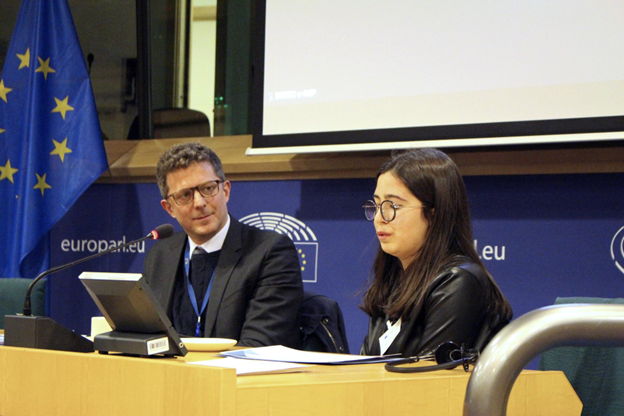
See her winning artwork here.
- Winners of the 15 to 16 category: Sofía González, Clara López, Ángel Muñoz from Manuel de Falla high school in Coslada, Madrid
“We were enthusiastic to share our views on the future of Europe, we gathered to brainstorm ideas and share opinions, and we put our creativity to work. With our picture we want to encourage EU citizens to vote in the next European Parliament elections in June as there is too much at stake. By voting we vote for the values the EU promotes: democracy, freedom, peace, equality, human rights”.
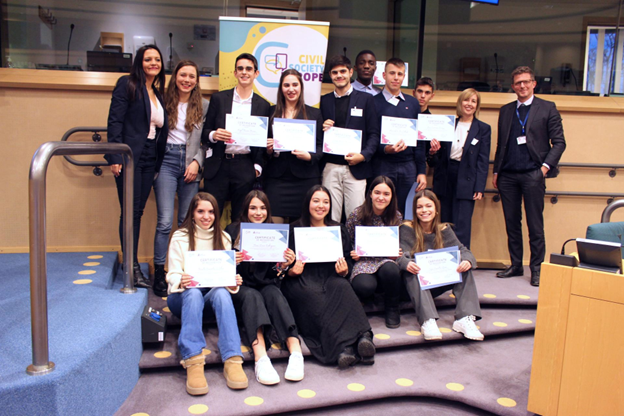
See their winning artwork here.
- Winner of the 17 to 19 category: Tea Josipovic from Serbia
“Although we are all coming from different countries and cities, and we are facing different issues every day, we all aim to make our home, Europe, a better place to live. In my work I wanted to present a Europe with greater emphasis on mental health and sustainability”.
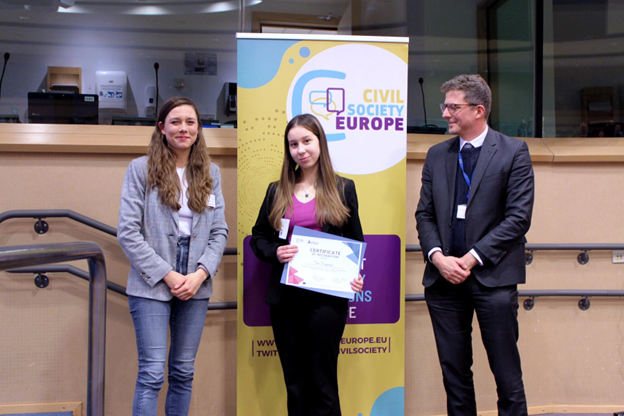
See her winning artwork here.
See the full list of winners and honorable mentions here.
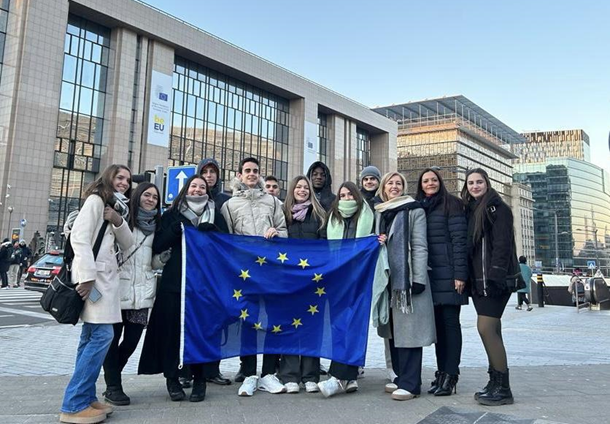
Visit to the European Institutions
The prize for the creative contest was an invitation to Brussels to visit the main EU institutions. During the morning of the 10th of January, guided by Civil Society Europe’s team, the winners and their guardians had the chance to visit the European Council and Commission, the Parlamentarium and the hemicycle of the European Parliament. In the words of Carmen García, teacher of the Manuel de Falla high school, “the students had the opportunity to see the importance and role of the different institutions in the heart of Europe. They were able to see the buildings of the Commission and the Council and learnt their functions. The visit to the Parlamentarium allowed them to explore many aspects of the EU Parliament: the history, the political parties, the diversity of countries and watched the film that explained how the different institutions work, the role of EMPs, the challenges we face and how difficult it is to reach common laws. The highlight was the visit to the hemicycle where they felt the atmosphere of the place where our representatives take decisions that shape our future. We all enjoyed the visit very much. Thank you to our guides, Carla and Nastasia for showing us everything in spite of the very cold weather and for the typical Belgian fries!”.
- Launch of EnTrust documentary video teaser
As part of the Final Conference, the EnTrust consortium presented the teaser of an upcoming series of documentary videos to highlight main findings and insights into the forms, determinants and consequences of trust and distrust in governance, as well as to give a voice to various research participants.
Watch the video teaser here.
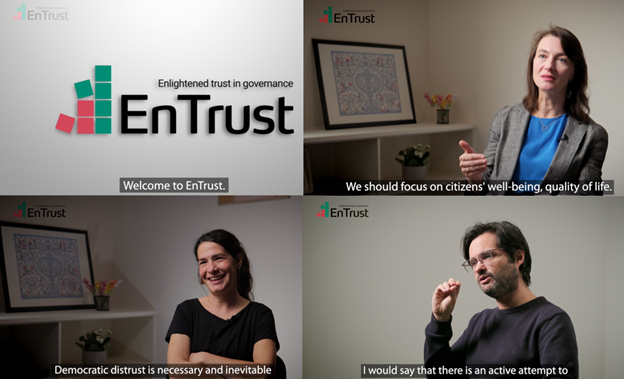
Do you want to know more about the EnTrust project and its findings? Stay tuned for what comes next! In the next weeks many outcomes will be published, including:
- A research report on forms, determinants, effects and remedies of trust/distrust, based on representative population surveys in 7 European countries, and experimental online policy deliberations
- A manual on evidence-informed policy making
- A guide on ‘enlightened trust’ providing insights into thresholds of changing trust levels, scenarios and preventive measures
- An Integrated Policy Paper with proposals at the European level based on the EnTrust research
- A manual to conduct a training on civil dialogue aimed at public officials and civil society organisations
- A collaborative website with concrete instructions for social movements and civil society organisations on how to conduct advocacy and policy making at the European level…
…and much more! In the meantime, you can read our European Policy Briefs and Research Reports, and follow us on social media to stay updated on our latest news!

